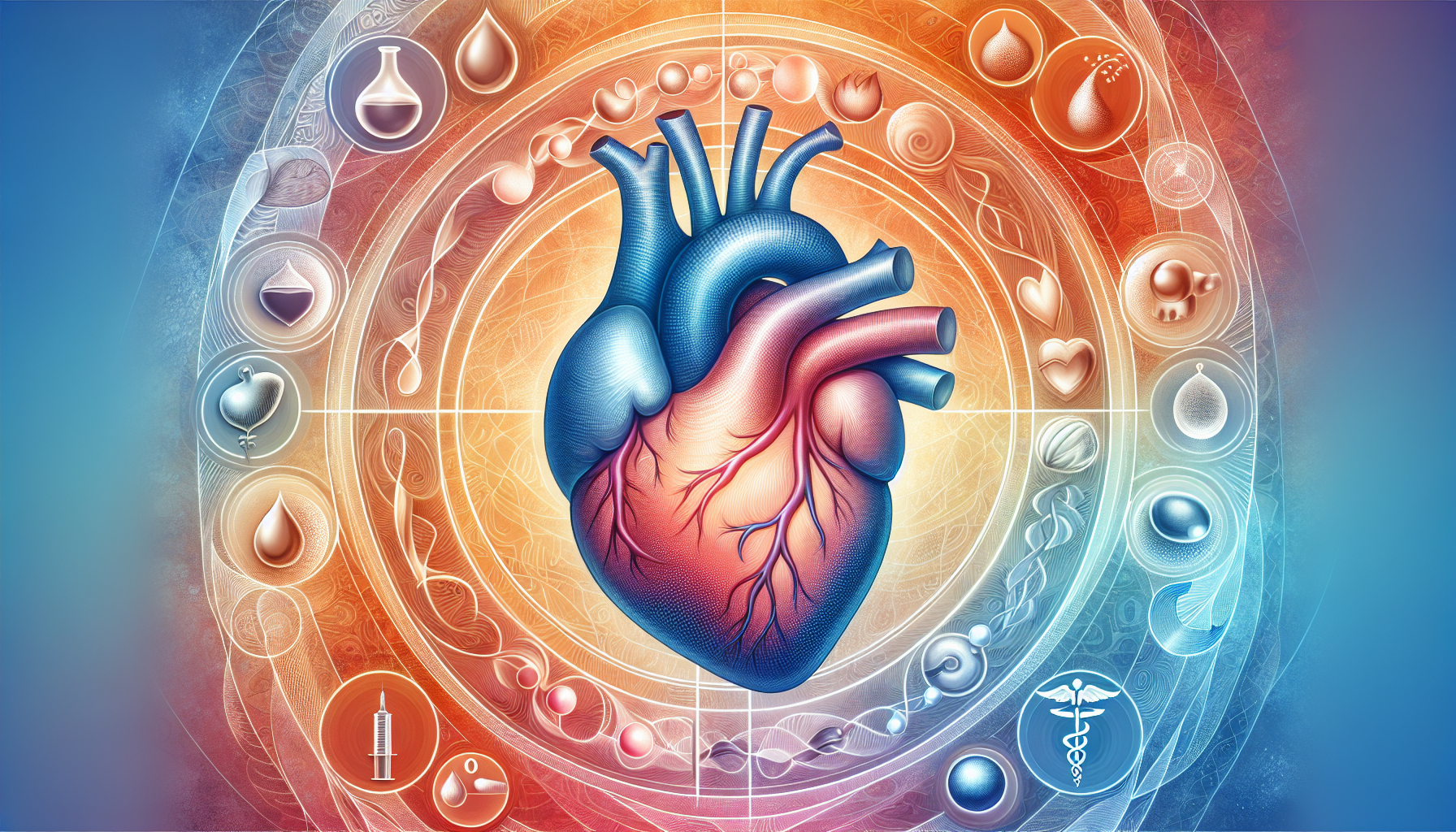The intricate symphony of hormones within the human body plays a pivotal role in maintaining our overall well-being. These chemical messengers are particularly crucial when it comes to cardiovascular health. Hormones such as estrogen, testosterone, thyroid hormones, and cortisol, among others, have significant impacts on the heart’s function and the health of our blood vessels. Understanding and balancing these hormone levels can lead to a stronger heart, better circulation, and a reduced risk of cardiovascular diseases.
The Role of Hormones in Cardiovascular Health
Cardiovascular health is profoundly influenced by hormonal balance. For instance, estrogen is known to have a protective effect on the heart by aiding in the maintenance of flexible arteries, thus reducing the risk of hypertension and atherosclerosis. Menopause, with its associated decline in estrogen levels, correlates with an increased risk of developing cardiovascular issues, which emphasizes the importance of hormone balance in women’s health.
Similarly, testosterone has been linked with cardiac health in men. Low levels of this hormone may elevate the risk of heart disease. However, the relationship between testosterone and heart health is complex, and maintaining optimal levels is essential.
Thyroid hormones are also vital, as they regulate metabolism, heart rate, and blood pressure. Both hyperthyroidism and hypothyroidism can lead to cardiac complications if left unmanaged.
Another hormone, cortisol, released in response to stress, can lead to a variety of cardiovascular problems if consistently high. Chronic stress can, therefore, be a contributing factor to heart disease due to the prolonged exposure to elevated cortisol levels.
For more in-depth information on maintaining a robust cardiovascular system, please explore Cardiovascular Health.
Balancing Hormones for Heart Health
To protect and enhance heart health through hormone balance, consider the following strategies:
Regular Check-Ups and Hormone Testing
Regular medical check-ups are crucial for monitoring hormone levels. For those with symptoms or at risk of hormonal imbalances, specific hormone testing can guide appropriate treatment plans. For example, thyroid function tests can help in diagnosing and managing thyroid-related cardiac issues.
Lifestyle Modifications
Diet and exercise are two powerful lifestyle factors that can improve hormonal balance. A diet rich in omega-3 fatty acids, fiber, and antioxidants can support heart health. The Impact of Antioxidant-Rich Foods on Heart Disease Risk provides insights into how dietary choices can influence cardiovascular health. Regular physical activity is also beneficial for maintaining optimal hormone levels and can be a preventive measure against heart disease.
Stress Management
Since stress hormones like cortisol can affect heart health, adopting effective stress reduction techniques is important for maintaining hormonal balance. Meditation, yoga, and deep breathing exercises can help manage stress levels. For more details on stress management, refer to Effective Stress Reduction Techniques for Heart Health.
Hormone Replacement Therapy (HRT)
HRT can be a valuable treatment for those suffering from hormonal imbalances that affect heart health, particularly during menopause. However, HRT should be approached cautiously and personalized, as it can come with risks. It’s crucial to discuss the benefits and potential drawbacks with a healthcare provider.
The Impact of Hormones on Circulation and Blood Pressure
Hormones do not only affect the heart directly but also play a significant role in circulation and blood pressure. For example, aldosterone, a hormone produced by the adrenal glands, helps regulate blood pressure by controlling sodium and water balance in the body. An imbalance in aldosterone can lead to hypertension, a major risk factor for cardiovascular disease.
To delve deeper into improving circulation for better heart health, consider reading Strategies for Improving Circulation and Cardiovascular Health.
Nutritional Support for Hormone Balance
Nutrition plays a critical role in hormonal balance. Certain nutrients are particularly beneficial for heart health, such as:
- Magnesium: Vital for heart rhythm and blood pressure regulation.
- Omega-3 Fatty Acids: Found in fish and plant sources, they support heart health.
- Fiber: Helps manage cholesterol levels, thus protecting the heart.
- Plant Sterols: Can reduce cholesterol absorption in the intestines, which may prevent heart disease.
Integrating these nutrients into your diet can be part of a strategy to maintain heart health through hormonal balance. Cardiovascular Benefits of Plant Sterol-Enriched Diets expands on the role of plant sterols in cardiovascular wellness.
Monitoring and Managing Heart Health in Special Populations
Certain populations, such as post-cancer patients or those with mental health disorders, may have specific challenges in maintaining hormonal balance and heart health. Monitoring and managing heart health is critical for these groups. For further guidance, the article Monitoring and Maintaining Heart Health Post-Cancer Treatment offers valuable insights.
In addition, exploring genetic predispositions to heart disease through genomic research can provide a personalized approach to preventing and managing cardiovascular conditions.
External Resources for Further Reading
For those interested in expanding their knowledge on the subject, here are a few niche and specific resources:
- The American Heart Association provides a comprehensive overview of how hormones and heart disease are connected.
- The Endocrine Society offers insights into the latest research on hormones and cardiovascular health.
- The National Institutes of Health has an extensive library of resources, including research on hormones and their role in heart health.
- The Mayo Clinic presents a detailed guide on managing menopause symptoms and heart health.
- The Harvard Medical School shares findings on testosterone therapy and heart health.
In conclusion, balancing hormone levels is an integral part of protecting and maintaining cardiovascular health. By understanding the roles different hormones play, implementing lifestyle changes, and seeking medical advice when necessary, individuals can significantly reduce their risk of heart disease and enjoy a healthier life.



